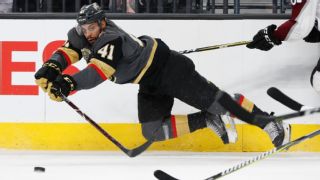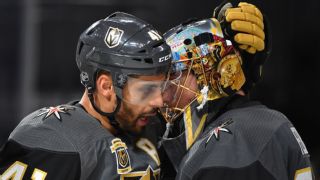|
By the time Pierre-Edouard Bellemare arrived as a "rookie" at Philadelphia Flyers training camp in 2014, the French forward had already spent a year in medical school, served an eight-year stint in Sweden, teetered on the brink of bankruptcy and learned his third language. So the fact that most of his prospective Flyers teammates had no idea who he was didn't faze Bellemare. Neither did their incredulity at his relatively advanced age. As he struck up a conversation with centers Claude Giroux and Vincent Lecavalier about the most recent world championships, Bellemare casually mentioned that he had played in the event for the first time about 10 years earlier. "Wait, what?" Giroux blurted, after quickly doing the math in his head. After all, in 2004, Giroux was still playing juniors. "Yeah," Bellemare said. "I'm 29." Giroux and Lecavalier stared at him, stupefied. "At that point, I think the guys started realizing that I was maybe a serious player," Bellemare says now. "Because [the Flyers] wouldn't just take up an old player for no reason." Bellemare made Philadelphia's roster out of camp. He was technically an NHL rookie -- even though, by Collective Bargaining Agreement qualifications, he was three years too old to be labeled as such. And now the winger, one of only 11 French players to reach the NHL, is in this fourth season and an alternate captain for the Vegas Golden Knights. His path to that Flyers training camp -- let alone to playing a key role three years later for a No. 1 seed in the Stanley Cup playoffs -- is an improbable tale. Now Bellemare and the Golden Knights, who rolled to a first-round sweep of the Los Angeles Kings and shellacked the San Jose Sharks in Game 1 of their second-round matchup, are 11 wins away from capping their wildly successful inaugural season with the unlikeliest chapter yet: hoisting the Stanley Cup.
Bellemare was born in a suburb of Paris, the third of five children. When he was 6, his 13-year-old sister, Aurore-Annick, asked their mother, Frederique, if she could play hockey. Bellemare and his 10-year-old brother, Geoffroy-Alexis, tagged along to her first lesson. "She was a little bit spoiled," Bellemare recalls of his sister. "So my big brother and I were like, 'All right, if she's going to play hockey, we want to skate.'"  The Bellemare brothers had never skated before, but as soon as they hit the ice they let go of the boards and began chasing each other. A local skating coach was looking on. He approached Fredrique and asked if her sons could return the next week for hockey practice. They did, and the coach put them through drill after drill. Pierre-Edouard fell on his backside quite a few times. And he fell in love with the sport. Hockey is still something of a fledgling sport in France. Though it has grown slightly over the past few years -- and the national team has risen to No. 12 in the International Ice Hockey Federation rankings -- the country only has about 20,000 registered hockey players. So as Bellemare became serious about playing hockey, few around him could visualize a future in the sport. Money was tight in his single-parent household. Bellemare never had the newest equipment; one pair of skates were already three years old -- and a size too small -- when he got them. His mother found a way for him to keep playing but stressed that education was more important than sports. "We did not have the easiest situation," Bellemare says. "So she was always like, 'What if you break your leg tomorrow? What are you going to do?'" Bellemare kept his goal in sight: He wanted to play professionally. His teachers often didn't understand his fixation. "Every year the teacher was like, 'He was having a good year but next year he can do better [if] he stops hockey,'" Bellemare says. "And every year they wanted me to decide: hockey or school? I kept saying, 'I'm going to keep on doing both.' I went on like this for a while." Bellemare was starting to get noticed in France, mostly for his speed. In 2002, he made France's top professional league as a 17-year-old. Two years later, he was representing France at a under-20 tournament when two men wearing Washington Capitals gear approached him. Bellemare didn't speak a word of English yet, so his team's general manager helped translate. "I remember them saying, 'Good work, we will look at you,'" Bellemare says now. His GM provided a more direct translation. "He was like, 'Hey, don't get a big head out of it. This will never happen to a French player,'" Bellemare recalls. "That is the way it is. I grew up in a country where hockey is sport No. 50-something [in terms of popularity]. Nowhere near the top. So when you play hockey, I mean, it's going to be a tough living ... you won't have enough money to live off that. For me, the NHL and all of this was never really in the conversation. After every year, there was always someone reminding me, 'This is France. It's not going to happen.'"
Bellemare continued playing in France until he was 20. To his mother's delight, he had begun his first year of medical school. He was set to become a chiropractor. But at the end of the academic year, he received a contract offer to play for Leksands Idrottsforening, a team that played in the second-highest league in Sweden, Hockeyallsvenskan. He knew if that for his hockey career to advance, he needed more exposure. "So I said, 'All right, I quit [medical school]," he says. "And I go to Sweden. That's when I really decided to be a pro." The hockey was a higher level of play, but learning the culture would prove to be even more daunting for Bellemare. Leksands held a fan event on the day he received his jersey. Bellemare got up on stage in front of 500 people, and an emcee began interviewing him. "What is your greatest quality on the ice?" he asked. Bellemare barely understood the question. So he responded: "Yeah, yeah, yeah." The interviewer moved on to another question. Again, Bellemare could not comprehend what he was being asked, so he responded: "Yeah, yeah, yeah." In the back of the room, he saw his future teammates laughing. Mortified, Bellemare called his mom that night. Frederique, once again, offered sage advice to her son. "Just show people you weren't there for the money," she told him, "but that you were there to learn the culture and just be part of it." So Bellemare set out to learn the local languages -- both Swedish and English. He tested his Swedish by going to the grocery store on his own, and even bought chiropractic books in Swedish. He didn't tell his teammates about his extracurricular studies until the day he felt comfortable enough, six months later, to join a conversation in Swedish. That earned him immense respect. That first year wasn't easy on the ice, either. Bellemare began as Leksands' 14th forward and had to move his way up the depth chart. The team also stressed defense, and instructed Bellemare to block more shots and become more proficient on the penalty kill. "I mean, my salary was lower when I was in Sweden," Bellemare said. "I almost went bankrupt the first year I was there. I had more money in France, so when I went to Sweden it was barely livable. ... I realized it was too tough. I was fooling myself believing that one day I would be able to make it." His mother constantly peppered him about whether he would resume medical school. Some days he would say, "Yeah, why not." Other days: "No chance." He did stick with hockey, and as he became more comfortable with his surroundings, the game came easier. In 2009, he signed with Skellefteå AIK of the Swedish Elite League. Bellemare's point totals remained modest (14 points in his first 55-game season, 18 the next, 36 in his third) but his game was becoming much more well-rounded; he was now regarded as a two-way player. Before the 2012 season, the Chicago Blackhawks expressed interest, but that cooled when a hip and pelvic injury cut his 2012-13 season down to 29 games. Just being considered by an NHL team is beyond a dream, Bellemare figured.
In 2014, Bellemare played for France in the IIHF World Championship in Belarus. He scored the deciding goal in a preliminary round upset of Canada, a 3-2 shootout win, and scouts really began to take notice. The Flyers came on the strongest. Because of what had happened with the Blackhawks two years earlier, Bellemare remained skeptical. "This is for real," his agent explained to him. "You're going to have a try in the NHL, and you're going to have a chance to make the most of it." The Flyers made it clear, beginning with their negotiations over the summer, what they needed: a guy for their penalty kill. Prove you're useful on the PK, they told Bellemare, and you'll make the team. Maybe it was because of the previous near-misses, but Bellemare remained cavalier about the situation. He had met his wife, Hannah, in Sweden, and they had a house there. His wife (who is half-Swedish, half-American) had her own business, Dalalva Wine Tastings, and was doing well. "If it didn't work out, at least I tried it and then I could go back home and never regret it," Bellemare said. "I didn't want to be the sour old French player saying, 'Oh, I couldn't make it.'" Bellemare did make the Flyers team in 2014-15. And in his "rookie" season -- in which he ranked second among Flyers forwards to Sean Couturier in short-handed time on ice -- he signed a two-year contract extension with Philadelphia, which named him an alternate captain. Despite his value, and the fact that he had become a fan favorite in Philly, the Flyers left the then-32-year-old exposed in the expansion draft last June. The Vegas Golden Knights swooped in. The expansion team's roster is full of players who were told, at some point, they were no more than spare parts. It was the perfect fit for Bellemare. "We're all brand-new guys," Bellemare says. "Here we had to learn about each other, learn who each guy is and what he is like, get a better understating of his situation and his family. We got tighter because of it." Bellemare converses with teammates William Karlsson and Oscar Lindberg in their native Swedish. The Golden Knights also have a handful of French Canadians -- including William Carrier, Marc-Andre Fleury, Jonathan Marchessault and David Perron -- and Bellemare finds comfort speaking to them in French. At 33, the well-traveled journeyman has found a home in Vegas. Like many of his teammates, he lives near the team's practice rink in Summerlin, which is 15 miles from downtown Vegas and a "great area to raise a family," Bellemare says. His family is expanding: He and Hannah welcomed their first child, son Leandre Lian, in January. And his team, of course, has looked unbeatable so far this postseason. That story, too, meshes perfectly with Bellmare's. He feels like, at this point, he's playing with house money.
|


